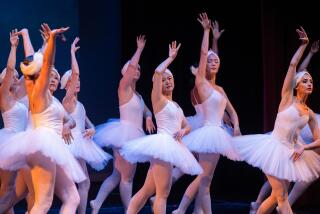THE BIX MIX : Dance : Black Pride in Motion
- Share via
Black dance in Los Angeles is as varied as the culture that gives it life. There are dance companies offering jazz, modern and tap from a black perspective, some flavored with gospel and street dance. There are also specialized dance forms which reflect the city’s ethnic diversity and include Afro-Cuban, West African, Haitian, Afro-Brazilian, Nigerian and Caribbean dance. And there are many black choreographers who don’t concern themselves with black culture or style.
However diverse the groups, they all share a number of common goals and concerns. Finance is an overriding issue for the sampling of companies queried here. Visibility is another.
Lula Washington, founder of Los Angeles Contemporary Dance Theater, says: “One problem is that most local presenters think black companies lack the quality to fill a house. The only way that will improve is if we put our work out there more often. Concerts once a year aren’t enough--we need more opportunities to perform.”
Washington’s company, 9 years old and best known for eclectic modern dance, performs about four big programs a year, plus smaller community performances. In an effort at broadening the community audience, Washington also schedules “works in progress” evenings in her studio to encourage interest and feedback.
Tap-dancer Chester Whitmore, who founded his 17-member “Black Vernacular Theater of Los Angeles” seven years ago, performs about 18-20 times a year locally and also does extensive national and international touring, always dancing his own choreography. Self-funded so far, he says he’s applying for grant money to do a movie about vintage Central Avenue show business days.
Repertory Dance Theater of Los Angeles, according to founder Jon Johnson, is known for its street-dance idiom and usually performs about 30 times a year, locally and on tour. “I’m trying to use today’s black community problems in my choreography,” he says. Unlike Whitmore, Johnson reports that grant support for his eight-member company tripled in the past year due to his efforts at re-establishing community roots after three years of touring.
R’Wanda Lewis, who founded her company in 1968, believes it is the oldest Los Angeles black company. Best-known for African, Caribbean and jazz dance it has been involved with such school performance programs as Inter-Cultural Awareness Programming (ICAP) and Learning Tree. Lewis says she does about 70 performances a year in schools and also works extensively with hearing-impaired and mentally retarded children and other children in Watts. Still recycling costumes she obtained during CETA program days, she says, “I go everywhere to get grants.”
Not yet included in educational programs such as ICAP, Leon Mobley’s West African Drummers and Dancers is a 10-member company founded two years ago. It performs traditional dances, presenting four shows a day last July and August at the Los Angeles Zoo, as well as appearing at community events. “A lot of blacks here don’t acknowledge their African roots,” Mobley says. “I want to get into school programs to give Afro-American youngsters a sense of who they are and where they came from so they’ll know where they’re going.”
Nzingha Camara’s 1-year-old company, Les Ballet des KoumanKele also performs West African dance, from Guinea, Senegal and Mali. She says she strives to maintain authenticity with no mixing of styles. Last year the 13-member company averaged two self-produced performances a month and this year will apply for grants.
Martin Dancers/Mission, a racially mixed 20-member company that combines singing and spoken words (in different languages) with dance, has been based here since 1980. Founder Shirley Martin says her goal was to revive Lester Horton technique on the West Coast and she gets many bookings from schools and universities, with private funding as well as grants.
Former Katherine Dunham dancer Billie Pope has a six-member group, the Shore Good Dancers, which performs about twice a year. In addition, for the past four years she has mounted a choreographer’s showcase, “L.A. Jubilee,” featuring the works and dancers of six local choreographers. All performances she notes, are funded by ticket sales, not grants.
In terms of the realities confronting black dance in Los Angeles, the 15-member (dancers and musicians) “Rhythms of the Village” is an example of a successful, established company still coping with financial strain. Founder Onochie Chukwurah, who came here from Nigeria in 1969 and once taught English, speech and drama at Compton High School (where his fledgling company began), says he is still struggling in spite of his many funding sources over the past eight years.
Although his company’s schedule includes over 100 performances a year for such organizations as ICAP, Music Center on Tour, Performing Tree, Hollywood Bowl Open House and major arts festivals locally and across the country, Chukwurah says, “The work is seasonal and I feel pressure because the money is not enough. I’d like to be able to offer an after-school teaching program for children.”
Chukwurah notes that although most of his audiences respond positively to his work, black community audiences seem to find it more meaningful, an observation shared by most black choreographers surveyed for this article.
Washington says, “Our community audiences appreciate modern dance, but they’re more enthusiastic about traditional African, gospel or jazz.” Johnson says black audiences identify more than general audiences with his street-dance orientation, while Lewis feels that black audiences are generally more responsive. Camara finds that black audiences feel a deeper pride in her work, but mixed audiences appreciate the multicultural aspects.
More to Read
The biggest entertainment stories
Get our big stories about Hollywood, film, television, music, arts, culture and more right in your inbox as soon as they publish.
You may occasionally receive promotional content from the Los Angeles Times.










